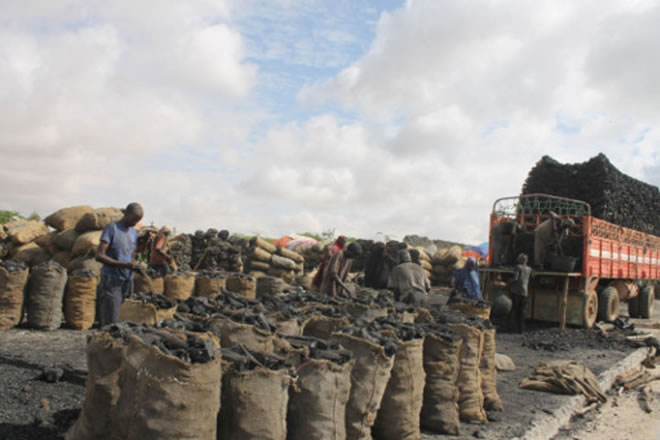
Casual labourers pack charcoal in an open market in the Yaqshid district of Mogadishu on October 26th. The United Nations Security Council has authorised the inspection of boats suspected of carrying illegal shipments of charcoal from Somalia. [Abdifitah Hashi Nor/AFP]

By Stephen Spark
Thursday, November 13, 2014
advertisements
More details have emerged about the contents of a container inspected at Mogadishu port as part of efforts to counter the illegal charcoal trade.When it was inspected on 28 October, the container was found to contain explosives, military uniforms, knives and magnetic devices used in improvised explosive devices (IEDs), the Somali government's minister of information, Mustafa Duhulow, told media.
The container was registered to a company called BIL and had arrived in Mogadishu from China on 22 October. Police are questioning two men about the illegal shipment.
Somali paper Sabahi reported that the seizure is being seen as a sign that the country is increasing its maritime and port security capabilities. However, vessel traffic monitoring remains inadequate and port security personnel are under-trained and poorly motivated, the paper noted.
On 24 October the United Nations Security Council (UNSC) authorised states and regional partners to "use all necessary measures" to search ships in Somalia's territorial waters and on the high seas where there are "reasonable grounds" to suspect them of carrying illegal arms or charcoal.
Despite the UNSC imposing a ban on charcoal exports from Somalia in February 2012, the $250M/year trade - controlled largely by Islamist insurgency al-Shabaab continues unabated. The Somalia-Eritrea Monitoring Group reported that 161 vessels carrying charcoal left the ports of Baraawe and Kismayo between June 2013 and May 2014 bound for the United Arab Emirates, Kuwait and Oman.
UK ambassador to the UN Mark Lyall Grant told the UNSC, "Charcoal is giving al-Shabaab a lifeline." Environmentalists also blame the illegal trade for causing desertification in Somalia, leading to drought and famine.